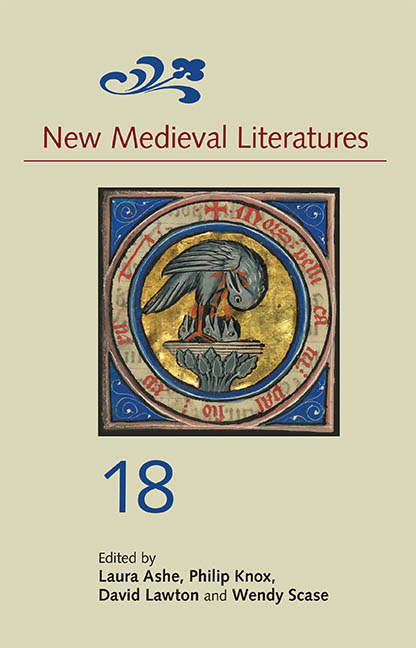Book contents
- Frontmatter
- Contents
- List of Illustrations
- List of Abbreviations
- 1 Arachnophobia and Early English Literature
- 2 Demonic Daydreams: Mind-Wandering and Mental Imagery in the Medieval Hagiography of St Dunstan
- 3 The Songs of Godric of Finchale: Vernacular Liturgy and Literary History
- 4 Sympathy for the Demon: Affective Instruction in the Katherine Group
- 5 Peynte it with Aves: Langland's Hawks, covetise, and Hugh of Fouilloy's Aviarium
- 6 Similes We Cure By: The Poetics of Late Medieval Medical Texts
- 7 The Life of Job: Bible Translation, Poem or Play?
7 - The Life of Job: Bible Translation, Poem or Play?
Published online by Cambridge University Press: 03 July 2019
- Frontmatter
- Contents
- List of Illustrations
- List of Abbreviations
- 1 Arachnophobia and Early English Literature
- 2 Demonic Daydreams: Mind-Wandering and Mental Imagery in the Medieval Hagiography of St Dunstan
- 3 The Songs of Godric of Finchale: Vernacular Liturgy and Literary History
- 4 Sympathy for the Demon: Affective Instruction in the Katherine Group
- 5 Peynte it with Aves: Langland's Hawks, covetise, and Hugh of Fouilloy's Aviarium
- 6 Similes We Cure By: The Poetics of Late Medieval Medical Texts
- 7 The Life of Job: Bible Translation, Poem or Play?
Summary
The Life of Job is an English biblical poem from the middle of the fifteenth century: a time when biblical poetry was not generally being written. It is a short poem, in rhyme royal stanzas, composed in aureate language that reads like an imitation of Lydgate. The poem cuts all the central material from the canonical Book of Job, removing all questioning about divine justice and the human condition. This leaves a kind of saint's life, with Job as a man of straightforwardly exemplary patience who is tested, rewarded and eventually dies. This hagiographical presentation, along with the incorporation of legendary material and a few episodes of the poet's own invention, fits fairly well into the older, thirteenth- and fourteenth-century tradition of biblical poems, works that ‘weave with ease and without self-consciousness in and out of the volume we know … as the Bible.’ But on the other hand, the poem is accompanied by a highly unusual set of glosses from the Vulgate, which clearly demonstrate exactly how each stanza corresponds to the Bible, making absolutely explicit the poem's status as a close translation of its chosen biblical passages.
The poem appears uniquely in San Marino, CA, Huntington Library MS HM 140, without title, author, or any kind of authorizing note. William McClellan has persuasively argued that the manuscript is made up of three originally separate fifteenth-century paper booklets. The first part (fols. 1r–92v), written in multiple hands, opens with Lydgate's Life of Saint Alban and Saint Amphibal, followed by a text of the Clerk's Tale without an opening prologue and with a truncated ending; it continues with shorter poems by Chaucer and Lydgate and an incomplete text of Lydgate's Testamentum. The second part (fols 93r–124v), written in a new hand, contains only the Life of Job (fols 93v–96v), and has numerous names and pen trials on the remaining blank pages. The third part (fols 125r–170v), written in further new hands, opens with The Libelle of Englyshe Polycye and an incomplete, Latin Apollonius of Tyre, which is followed by several prayers and treatises, including a piece of advice to apprentices; as Seth Lerer has commented, it has the feel of a commonplace book.
- Type
- Chapter
- Information
- New Medieval Literatures 18 , pp. 211 - 242Publisher: Boydell & BrewerPrint publication year: 2018



